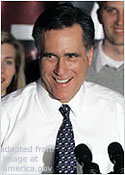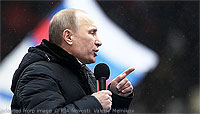Putin and Romney: Back to the Cold War?
James Brooke - Voice of America - 4.2.12 - JRL 2012-61
James Brooke is VOA Moscow bureau chief, covering Russia and the former USSR.
Americans living in Moscow are suffering from mental whiplash.

file photoDuring Russia's recent presidential election, we enjoyed the moral high ground.
Our politicians, we thought smugly, would never stoop to reviving the Cold War to wake up their conservative bases.
But, in a city where snow fell on April Fool's Day, it's dangerous to walk with your nose in the air. Ice still covers many sidewalks here.
Yes, Mitt Romney pulled a Putin.
"Russia is, without question, our number one geopolitical foe," the leading Republican Party presidential candidate warned CNN TV anchor Wolf Blitzer.
Similar to Vladimir Putin alleging Washington was behind last winter's democracy protests, Romney was targeting his party's elderly base.
Romney followed up with "Bowing to the Kremlin," a Foreign Policy website article that concluded: "For three years, the sum total of President Obama's policy toward Russia has been: "We give, Russia gets."
Then, The Washington Post popped Romney's balloon by digging up a poll conducted last year for CNN. It revealed a generational Grand Canyon in American attitudes toward Russia. For the Cold War generation, 47 percent of Americans polled over age 50 saw Russia as unfriendly toward the United States. In a flip, 70 percent of American adults aged 18 to 49 saw Russia as 'friendly."
Separately, in a U.S. News/Chicago Tribune poll conducted in the United States last week, 78 percent responded negatively to Romney's "number one geopolitical foe" remark.

file photoPutin and Romney may have been separated by birth and class one in working class Leningrad and the other in upper class Detroit. But they cling to comfortable Cold War worldviews, at least in public.
Meanwhile, in Moscow, some Americans thought that Russian real politik would soon reassert itself. The positive thinking was that last winter's anti-Americanism was an electoral gimmick designed to animate lethargic voters.
Immediately after Putin won the March 4 Presidential election, a high Foreign Ministry official chirped that Moscow assumed the three-year-old reset policy with Washington was on track. On Afghanistan, Moscow tentatively agreed to allow NATO cargo jets to refuel at Ulyanovsk, an air transit hub on the Volga. Then in Seoul, outgoing President Dmitry Medvedev declared that, on his watch, U.S.-Russian relations have been the best in a decade.
Addressing Romney, President Medvedev told reporters: "It is 2012, not the mid-1970s."
On Sunday, US Vice President Joe Biden picked up this theme, saying of Romney on CBS: "He acts like he thinks the Cold War is still on, Russia is still our major adversary. I don't know where he has been."
In Moscow, some Americans assumed that, with the elections over, the Kremlin's party line had changed. Russia is hemorrhaging $10 billion a month. The government relies heavily on high oil prices to pay its bills. To diversify the economy, the K